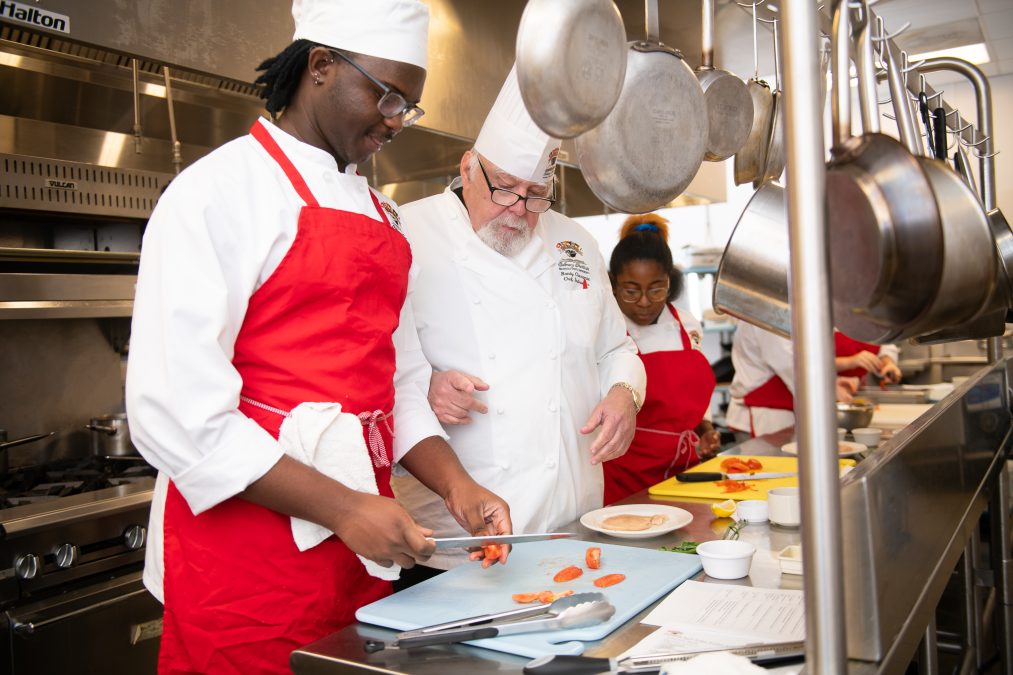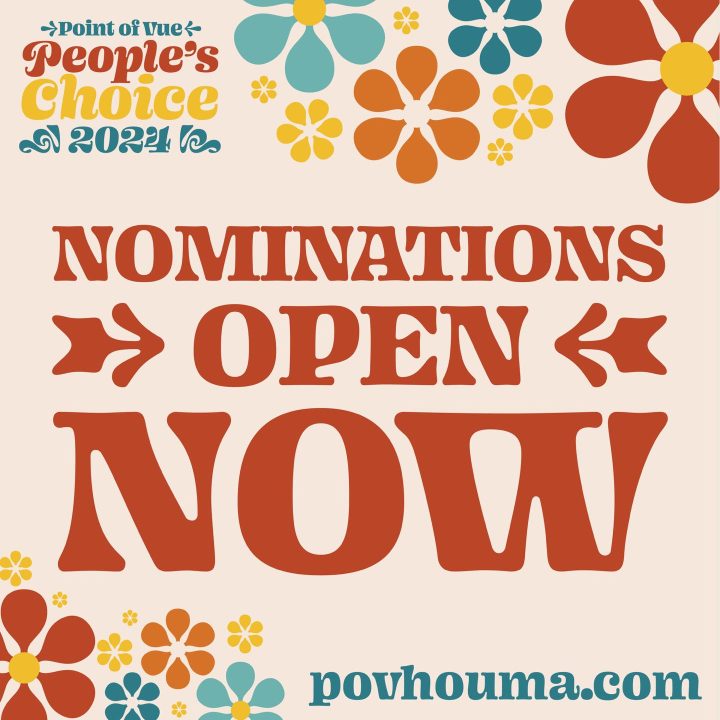
A Renovation Celebration – Chateau Chic March 2024
March 5, 2024
Ekbeh | From the Bayou to the Big Screen – March 2024
March 5, 2024As Chef Randy Cheramie, instructor at the Chef John Folse Culinary Institute, puts it, the two best things to come out of the New World were jazz music and Cajun-Creole cuisine. The Chef John Folse Culinary Institute first appeared on the campus of Nicholls State University in Thibodaux, La. after the then president of Nicholls, Dr. Donald Ayo, and Chef John Folse were “lamenting over a bowl of gumbo and I’m sure a couple bottles of wine, that here we are just maybe fifty minutes away from a mecca of fine dining in New Orleans, and really there was no formal school that really taught the precepts, the tradition, the culture of Cajun-Creole cuisine,” according to Randy.
In 1996, they were given the okay for a two year program until going back to the Board of Regions and getting the okay for a four year bachelor’s of science program. Today, the Chef John Folse Culinary Institute is still the only four year culinary public school in the nation.
In the early years, the culinary program resided in Gouaux Hall which is the biology building on Nicholls campus. That meant that when you walked through the front doors you could smell one of two things: fresh bread baking or cats and formaldehyde. Randy said, “A lot of the equipment in there was donated and not of the best caliber. When it rained outside, it rained inside. We were just so tired of putting up with it.”
Chef Randy explained how lucky they felt when the state decided to put up some more money, and even though they had to find the rest, they made it work. As far as the designing process went, the faculty was asked what they wanted in the school.
“They said if you had 1200 sq. ft. to build a kitchen in, how would you do it? They did it to our design. Every teaching kitchen is designed for 16 students and they have more than ample space to do what they need to do, and cooking equipment,” Randy said.
At the Chef John Folse Culinary Institute, students are prioritized and educated in a way that encourages them to pursue any future they want after graduation. They are taught everything they need to know about classic French cuisine, like every other culinary school, because that is what’s considered classic cuisine. But unlike any other school, they are taught everything about Cajun-Creole cuisine.
“We do a day where they cook nine gumbos; where else are they going to do that? We teach them about the traditions of Cajun-Creole cuisine. What’s so great about cooking in South Louisiana is that people here cherish and prize gathering around a table and sharing food and drink unlike any other place you’ve known. It’s not like this in other places where people decide to go out and eat, not because it’s an anniversary or somebody’s birthday, but because it’s Tuesday and why not?” said Chef Randy. “And they’re going to go to a great restaurant, buy some wine, sit there, talk, laugh, and eat some great food. That’s a big part of our culture and I love that. I wouldn’t want to cook anywhere else!”
Another huge factor that contributes to South Louisiana’s food success is the natural resources that can be found down here. Chef Randy believes these resources are second to none.
“Creole tomatoes in May and June, they are the best tomatoes on the planet! I have a few slices with every evening meal when they’re that good. Anything you stick in the ground will grow, we’re just so very lucky, and we’re lucky to be among people who love to eat and gather and have fun. It’s such a big part of our culture. We teach all of those things,” said Randy.
The local cuisine here is so unique and unlike any other regional cuisine all over the country and all over the world. It’s special in that seven separate countries contributed to the cuisine. Recently, Chef Randy taught about the Native American influence in Cajun-Creole cuisine and indulged his students to the tastes of Indian fry bread, rabbit stew, and more cultural dishes that found their way into this lexicon of eating. Randy is a firm believer that if you take any of those nations out of other cuisine, it would simply not be the same.
And just as he believes in the cuisine, he believes in the students of the institute. After twenty-four years of working at the Chef John Folse Culinary Institute, Randy would put his students up against anybody in the business. Their prestigious internships include working elbow to elbow with students from the CIA and Johnson & Wales, and according to Randy, the Nicholls students “smoke them everytime”.
Having competed against them in several ways, in the American Culinary Federation (ACF) competitions, and in San Pellegrino competitions where they won the regional five years in a row, the Nicholls culinary students have gone on to set up a great relationship with Paul Bocuse in Lyon, France.
“We send six or seven kids there every summer and they’re being taught by French master chefs and much of the instruction is in French, which is pretty cool. They go there among a really diverse student body, students from 20 different countries around the world. The last time they were ranked was the class that went before the pandemic, and out of forty-eight students, we sent seven and they ranked first, second, third, fifth, seventh, ninth, and sixteenth,” said Randy.
These students’culinary excellence extends even further than internships and into their own student-run restaurant on campus: Bistro Ruth. Every culinary school has some sort of restaurant and cafe, but the difference between others and Bistro Ruth is that there are teams in the class and each team will do their own menu.
“We tell them all the time, this restaurant belongs to you, it’s yours, make of it what you will. They do intense research on the menu they’re gonna do. Most times it’s thematic: Mexican influence, Thai, Asian influence, hot Creole. New Orleans Creole is the one we do the most because that’s what we’re the best at,” said Chef Randy.
The students are responsible for ordering the food, prepping, cooking, and serving the food while the instructors are there to facilitate. They know their customers and cater to their tastes. They also put into practice a few different types of service. The first service of the semester is an upscale buffet so the students can learn how to keep the buffet looking attractive. Next up is American style, which is four courses. The first course is a hot soup or a gumbo, then a salad, and the main course has four options the guests can choose from, and then a dessert.
The final seating of the bistro is Russian service, which has nothing to do with Russian food, but everything to do with planned choreography. This is the service that tends to sell out the fastest at Bistro Ruth. It’s a seven course menu served in a Russian style where the food is put on beautiful trays and brought out to the dining room. A portion is then taken off of the plate and served to the guest in the dining room, and it’s all choreographed. If it’s the main course, there will be one student who will lay down the starch, the meat portion will be leaned against the starch, and the next person will have the sauce. Everything is served in unison. Wine service and bread service are also done in a Russian style as well.
Along with the bistro, the CJFCI also has a retail bakery and partners with Nicholls’Bridge to Independence program to run it. Under the supervision of Chef Tammy Rink, the Bridge students aid in the production of baked goods and help in the actual selling of them in the bakery.
Many students have graduated from the CJFCI and have gone on to accomplish some remarkable feats within the culinary world. Alumnus Michael Gulotta was an extraordinary student according to Chef Randy, and went on to work in the Restaurant August, trained in Europe for sixteen months, and returned as the chef de cuisine of the kitchen. After ten years, he opened up his restaurant MOPHO in New Orleans which serves a fusion of New Orleans and Vietnamese cuisine. In the Central Business District of New Orleans, he’s opened up Maypop, another full-service restaurant, as well as an Italian restaurant on Metairie Road called Tana.
Other successful alumni include Megan Bickford, who has worked her way up to becoming the executive chef of the highly-acclaimed Commander’s Palace in New Orleans. Alumnus Drake Leonards is now the executive chef of Eunice in Houston, Texas. Nick Landry is a research development chef for Southeastern Mills.
“Our students have gone on to do some really great things […] At Nicholls, we make you do it all. If you want to be a pastry chef, guess what? We want you to be a pastry chef too, but you’re going to learn some basic skills. You’re going to learn how to use a chef’s kitchen. We’re going to teach you how to cut meat, fish, and vegetables. You’re going to learn how to make soups and sauces. […] Then, you’ll take the normal baking classes and after you get through the skills, you can start taking your concentration classes. [..] That’s what industry people love about our students. They have a concentration but they can do it all,” said Chef Randy.
In all of his twenty-four years with the institute, Chef Randy has never missed a class or been late to a class because he loves what he does and appreciates the talent and the passion these students have for the culinary industry. Even though Chef Randy is retiring, he will continue to teach a class two days a week because he just loves what he does. After working in the restaurant business for twenty years, Randy said returning to Nicholls as an instructor rather than a student was the best decision he ever made, and now, twenty-four years later, he still counts it as a blessing.
“Nicholls is a great school. […]The instructors care about you. You can talk to them. My students know they can come find me in my office any time they need to. I work with some great people. I think you get a private school education for a state price. You can be challenged here and you’ll have the basis of your entire career right here and it’ll be a great education. I promise you!”










